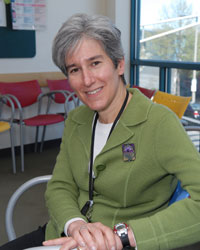Intervention Reduces Parental Stress After Autism Diagnosis.
A cognitive-behavioral intervention known as problem-solving education (PSE) may help reduce parents’ stress and depressive symptoms immediately after their child is diagnosed with autism spectrum disorder (ASD), according to a study by Emily Feinberg, associate professor of community health sciences at the BU School of Public Health and of pediatrics at the BU School of Medicine, and colleagues.
Mothers of children with ASD consistently report high levels of stress, depressive symptoms and social isolation, according to the study, published online in JAMA Pediatrics. That psychological distress suggests a need for interventions that specifically address parental mental health after a child’s diagnosis.

Researchers conducted a clinical trial in an autism clinic and six community early-intervention programs with 122 mothers of young children (under 6 years) who recently received a diagnosis of ASD. Fifty-nine mothers received six sessions of the structured problem-solving program, and 63 mothers received usual care. Parental stress and maternal depressive symptoms were then measured after three months of treatment.
According to study results, a lower proportion of PSE mothers, compared to the other mothers, had parental stress (3.8 percent vs. 29.3 percent, respectively). PSE mothers also were less likely to report depressive symptoms than the other group, but the difference was not statistically significant.
“Future analyses will examine the effect of intervention over a longer follow-up period and allow us to assess whether the intervention worked differently among subgroups of mothers, which is knowledge that could help us better target those most likely to benefit from the intervention,” the authors said.
The study was funded by grant from the Maternal and Child Health Bureau of the Health Resources and Services Administration, one of the agencies reporting to the U.S. Department of Health and Human Services.
Submitted by: Lisa Chedekel Chedekel@bu.edu